Just finished reading this great little story on Spin, written by Kevin Bronson, about a couple of young musicians from L.A. who drove 22 hours to pay homage to Flaming Lips frontman Wayne Coyne, only to end up spending four days at Coyne’s Oklahoma home — | 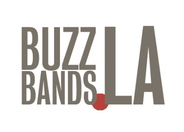 Click on this icon to visit Kevin Bronson's Web site. |
and recording a track with him while they were there. (Coincidentally, the Times Magazine featured Coyne’s Oklahoma compound in our Domains column not too long ago.) Bronson is the publisher and editor of Buzz Bands, a Web site dedicated to the music scene in L.A. It is incredibly smart and plugged in, and he is tireless in his coverage. Between him and his collaborator, Seraphina Lotkhamnga, the site appears to be everywhere at once. According to one of his year-end wrap-ups for 2011, Bronson saw “more than 500 bands perform live over 265-plus days of show-going, and still I feel as if I missed a lot.” So, this is basically a full-time job, I asked him. “It's just a little obsession,” he said. When I was a young pup in Peoria, all the guys at paper would say, “You gotta meet Bronson!” “We gotta get Vecsey and Bronson together!” He was a native son — Woodruff High School, Bradley University — who left Peoria for the blue skies of California, where he was an editor at The L.A. Times. Like the swallows in Capistrano, though, Bronson would return to Peoria every March for his fantasy draft, and when we finally met, we quickly bonded over a shared love of baseball and Mister Donut. A few months later, he scored me a couple stringing bylines in The L.A. Times. In 2008, Bronson became yet another victim of the print-media meltdown, being “summarily laid off” by the paper after 18 years of service, more than 30 in the industry all told. But cool dude that he is, he forged ahead on his own terms. Having written the Buzz Bands column and blog for the paper for six years, he took the brand with him and created his own Web site. “The blog doesn't make much money,” he told me, “but it enables some other enterprises, like freelance writing, booking/promoting shows, DJing in clubs and hosting radio shows.”
Part of me always thought that I’d return to The Peoria Journal Star someday. Maybe after the kids were done with school, when I’d had my fill of bigger cities, I could go back to where my newspaper career began to be some kind of department head or columnist as I go gentle into the dotage of my golden years. It might never have happened, but it was always fun to think about. Now, even that fantasy is all but gone. Operations at the Peoria Journal Star, along with the other 97 papers of the GateHouse chain, are now subject to being slimmed down and centralized at so-called publishing hubs outside Chicago and Boston. The same thing recently happened at my previous stop, The Atlanta Journal-Constitution, which had its copy and design desks outsourced to hubs in Dayton, Ohio, and West Palm Beach, Fla., as part of a centralizing program by the Cox chain. From the sound of it, the desks in Peoria are safe for the time being. Its guild is in the midst of negotiating a new contract, which should keep the copy editors and designers in town for 18 months. After that, though, it’s a near certainty that people will lose their jobs. That has already been the case at some of GateHouse’s other papers in Central Illinois, where staffers in Galesburg and Springfield will be affected as soon as April. Copy editors and page designers, a veritable family on nights and weekends, are being scattered to the wind by either relocating, finding other jobs or, more common these days, getting out of the business all together. And these are people who truly love print journalism, who love the image of the ink-stained wretch, who will work themselves within an inch of a coronary every night just to get one more high-school basketball box score in before deadline. It’s a true foxhole situation, the production side of newspaper work, when you hunker down in the slot and the rim as the last line of defense against mistakes, watching each other’s backs and diving on a hundred hand grenades a night. And when the paper is finally put to bed, you slump out in a tired, miserable pack to a late-night watering hole, where you bitch and complain about it until four in the morning. Then you wake up the next afternoon and do it again. To work the copy desk on a small-town newspaper – or even a big-town newspaper – is to foster a protectiveness of that community, a sense of guardianship over the values and priorities of the people who live there. The word “stewardship” is used a lot in describing a copy desk’s handling of a local story, conveying a sense that it will be shepherded through the process with a hand that is sensitive to even its smallest details. I have a hard time believing that a universal desk outside of Boston will have that same sense of stewardship over issues that concern Eureka, Illinois. It helps to have to drive home through the town you have just written something about. I asked somebody who might affected by all this what the process might look like, and this is what they said, although it was somewhat of a hypothesis: “Someone in Galesburg will edit the story, which gets sent to a central design desk somewhere. The designers will put together certain pages, like ‘national news’ and ‘national sports’ and ‘national agate.’ The page will be sent back to Galesburg for proofing before it's put on the press. Sounds like the page in Galesburg will be identical to the page in dozens of other GateHouse papers. I guess copy-editing would follow. From what I've heard at a couple of other places that already outsource, the editing and design eventually could be/would be handled by people who have never set foot in the community whose news they're editing.” I'd like to hear your opinions on this subject, particularly my journalist friends, and I’ll touch on it a lot more in the coming weeks and months, but I just wanted to offer this quick gut reaction to this news. Friends of mine will lose their jobs — jobs that are thankless and have brutal hours and intense pressure and pay for shit and that they love with an intense dedication nonetheless. A community that I lived in for 10 years will have its local paper cut up into pieces and assembled like a piece of Ikea furniture by strangers hundreds of miles away. “The happy quotient is in the red,” one friend of mine in Central Illinois said of newsroom morale. There’s no denying the economic pressures on the industry; things have to adapt. But that doesn’t negate the sense of loss we feel every time a hometown paper is homogenized by its chain ownership.
_ Remember when I blew your mind with Ginsberg’s Razor? Well, it doesn’t end there. Here comes the Allen Wrench. Not only has The New York Times treated “Ginsberg” and “Ginsburg” as interchangeable last names, most noticeably when it comes to Ruth Bader Ginsburg and Allen Ginsberg, but we also have managed to misspell Allen Ginsberg’s first name at least two different ways. (In one story, you’ll remember, we misspelled both of his names.) Well, another literary type named Allan has come to light as a trouble spot over the years, not just for The Times but for New York City, as well. Here’s an item from Tuesday’s corrections:
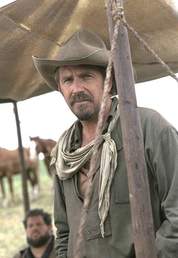 _ I would never admit this around my cultured colleagues at The New York Times Magazine, but I am a big fan. It’s a guilty pleasure, I admit, like Duran Duran, Gawker or spooning peanut butter from the jar while watching "The Biggest Loser." I know your stuff is schlock. But like a good bowl of mac’n’cheese, it’s gooey and warm and perfect for a cold winter’s afternoon when you just want to curl up and hibernate your synapses for a while.
In some ways, you are the anti-Method actor. Whereas Robert De Niro and Meryl Streep and Daniel Day Lewis contort their bodies and faces and voices to become a character, you just kind of show up. Same haircut, same accent, same mannerisms. It’s Crash Davis as a cowboy, or it’s Crash Davis as a Union soldier, or it’s Crash Davis as the Louisiana D.A.
But it’s your birthday, and I came to praise you, not bury you. If you had given us nothing more than Crash Davis and Ray Kinsella, you could have called it a career. Then tack on "No Way Out," "American Flyers," “Tin Cup” and “For Love of the Game,” and you've done all right for yourself. I can find reasons to like a lot of your movies, warts and all:
Do I like "Open Range"? No, I don't like it. I fucking love it. It's probably my favorite movie of yours. Do I wish you didn't fire about 15 bullets from your 6-shooter in the big gunfight? Sure, I do. That was ridiculous. But I fucking love it anyway.
 _
Do I like “Dances With Wolves”? Of course. Do I wish Stands With a Fist didn’t have frosted highlights in her teased and feathered hairdo? Yes. She looks like she’s from the Sioux band that fought the battle of Rodeo Drive.
Do I like “Robin Hood”? Sure. Do I wish you didn’t sound like a beach bum from Malibu? Hell, yeah. When Russell Crowe revived Robin Hood, he faced criticisms that his accent was more Scotland than Northern England, and I’m sure it was all he could do not to say: “Are you fucking kidding me?! Scotland vs. Northern England? Did you people hear Costner do Robin Hood as if he were Pauly Shore?” Right in the middle of your big Sherwood Forest soliloquy, I half expected you to say: “I believe in good Scotch, softcore porn and opening presents on Christmas Day!” Oh, Robin of Locksley, you do give speeches!
_ Can we stop with the Titanic parallels now? Please. I know it’s the 100-year anniversary of Titanic, and I know the Costa Concordia also was a big, luxurious cruise liner, and I know the comparison is inevitable. But can we please stick it back in the lower half of the story where it belongs as an quirky afterthought? The Titanic sunk – sunk – in the middle of the North Atlantic in the middle of the night in the middle of winter with the nearest ship four hours away. More than 1,500 people – 1,500 – died in the icy water. The Costa Concordia, meanwhile, basically ran aground about 10 feet off the coast of Italy. There were probably fishermen sitting there on the rocks, going, “Hey, don’t cross my line!” The Titanic sent its S.O.S. message in Morse code by telegraph. People on the Costa Concordia were live-blogging their evacuation. I know this makes me look insensitive. But I’m not. I just want to be able to show the appropriate amount of sensitivity without the news media trying to ramp it up to Titanic proportions. Being on that ship would have been awful, a living nightmare, no matter how close to shore you were. Lives were senselessly lost, and there is never any minimizing that. I want to be sympathetic to the horror that those people experienced, but don’t give me: The wreck of the Costa Concordia is like a modern-day Titanic! It's like comparing Balloon Boy to the Hindenberg. The only appropriate comparison is the incompetence of the crew and the metaphor for hubris and excess. Last September, by the way, a Tanzanian ferry sank, killing more than 200 people. The big headline in the U.S. papers read: Is It Over Between Kim and Kris? Last July, a Russian cruise boat sank, killing around 130 people, almost of half of them children. Easy to overlook that story; the Yankees played that day. And last April, a ferry in Bangladesh capsized, killing nearly 30 people. The big headline in the U.S. was: Will Elin Watch Tiger at Masters? (Don’t confuse this with the Bangladeshi ferry that capsized in 2009, killing nearly 40 people.) So, you know, just because this boat was big and beautiful and had a 24-hour buffet and slot machines, let’s not overplay the disaster card.
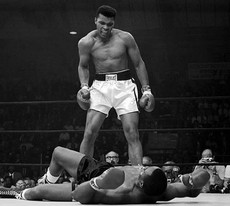 _I’m no celebrity worshiper, but there are times when you find yourself in the presence of such acute greatness that you can’t help but just acquiesce. I think Richard Harris described this phenomenon in “Unforgiven,” when he draws the difference between a president (“I mean, why NOT shoot a president?”) and a queen (“You would stand ... how shall I put it? In awe.”) And so I stood in awe in your presence once, just happy to be in the room, at a book signing for Howard Bingham at an art gallery in TriBeCa sometime in the late '80s, early '90s. I have heard people describe what it’s like be in a room when it hushes over in deference, but that was the most dramatic example of it that I have ever experienced firsthand. Not just in the presence of greatness, but The Greatest. The crowd parted as you were ushered to the podium, where you waited for your introduction from Bill Cosby ... who was nowhere to be found. I was in the back of the room, on the fringe of the crowd, when I felt a pair of hands on my shoulders. Thinking it was my father, I turned to say something, when I found myself looking into the eyes of the Cos himself, trying to push his way to the stage. “I guess I should get out of your way,” I stammered. Cosby smiled and said, “You’re fine, you’re fine,” as he swung by me and made his way to the stage. A pretty cool night, overall. Of course, in most families, a momentary brush with the Champ, or even the Cos, would be a dinner-table story for life. I was fortunate to have a sportswriter for a father, who spent considerable time around you and was able to convey to me not just your grace and power in the ring but your fortitude as a human being, your steadfast convictions in what you believed in. In your hometown of Louisville once for the Kentucky Derby, my dad took me on a tour of the place I lived for two years but would never know. In a little downtown square, he stopped the car and said: “I saw Ali speak here in 1974.” You had just beaten Foreman in Zaire, and you were returning to a hero’s welcome in your hometown. My dad recounts it this way: "Harvey Sloane was the mayor, and he’s presiding over this ceremony and he gets up there with Ali, and there are 10,000 people up in the square. Next to Ali is this little black guy, about 5 feet tall, just grinning. Ali says, 'You know who this guy is?' except he doesn't say 'guy,' he's using the n-word. Harvey Sloane is going like, 'Don't do this to me!' but Ali is just going, 'Not only did I go to Zaire and beat Foreman's ass, but this little n---- is the guy flying the plane!' " Here is Jet magazine's account of the day, which says that the pilot was Sultan Muhammad, the grandson of the Hon. Elijah Muhammad, but doesn't mention your acknowledgement. Ebony magazine, meanwhile, does mention it, quoting you as saying: "You white folks still think Africans live in trees. Well this man here ain’t no tom-tom beater; he’s a highly skilled pilot who can fly a jumbo jet as good as any white man!” And that's the Muhammad Ali I'll remember today: the one who took the opportunity of his day in his hometown to not just trumpet his own accomplishments but to trumpet for his entire race.Happy birthday, Champ. I hope you don't mind, but I got you the same thing I got Martin Luther King for his birthday: A clip from "Coming to America."
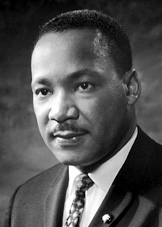
Very often, I’ll hear somebody muse: I wonder what Martin Luther King would have thought about a black man in the White House! As if you would have been at all surprised or amazed or satisfied. I don’t think you would have been any of those things. To imply any kind of amazement would be to imply that you didn’t really believe it would ever happen, and I don’t think you could have lived the life you did without believing that this progress was not just possible but inevitable.
If you were still with us today, I doubt that you would be sitting on a beach somewhere basking in the advancements that have been made, saying, Mission accomplished. Probably your attention would still be focused on the inequalities – racial, economical, religious – that still exist in our society. You’d be at Zuccotti Park and the Gay Pride parade and the ground-zero mosque, and you’d still be marching on Washington to tell even this president of the injustices that exist under his watch. (And the irony of that is that some of the people who called you a troublemaker in the 20th century will just simply call you an ingrate in the 21st. Like, We gave you this, this and this, and you now you want THAT!)
Having lived for three years around the corner from your birth home in Atlanta, around the corner from the Ebenezer Baptist Church and the King Center, I had plenty of opportunity to reflect on your legacy. Thank you for your message of peace, for being a spokesman of equality. I am sorry you had to pay such a heavy price for it. If it’s any consolation, know that when I see the world my children live in, I see a world without racial definition. Each of my daughters has a diverse circle of friends in every shade, from every corner of the world. They see nothing unusual or noble or open-minded about it, it’s not classifiable, the way it was even when I was growing up in the ‘70s and ‘80s. It just is.
For your birthday, I got you three stellar MLK pop-culture references:
Just got a threatening letter from the International Center of Blog Monitors saying that Just Some Guy was the only blog on the Internet not to mention Tim Tebow today and that failure to do so before the start of tonight's game would result in the instant revocation of my blogger's license. So: Tim Tebow. I have no problem with God. I don't even mind when athletes recognize God in gratitude for their opportunities and abilities. But when Punch and Judy hitters start thanking God after every four-bounce single up the middle, that's where I draw the line. Blessed are the meek, yes, but God is a doubles hitter. Spray hitter, power to all fields. An 80-yard touchdown play in overtime? That's God's work. But that 3-yard run off tackle in the first quarter? No. God is a big-play guy. God is the Buckner play. I think that's what this "SNL" skit was trying to say. Phil Theobald, another of my great mentors, used to ask God-praising athletes: So why did God hate the other team so much?I love the Tebow story, the miraculousness of it, the polarization, the phenomenon. It's the kind of story that makes sports great. I love the Tebowing Internet meme. I love Jimmy Fallon's Te-Bowie. But most of all, I love any reason to dig up the following clip from "Hoosiers," one of my favorite movies: "God wants you on the floor."Here are two nice reads on Tebow: Dan Barry in The Times and Rick Reilly on SI.com.
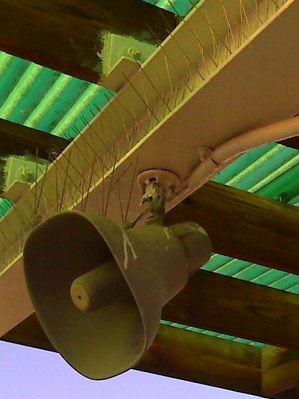 Some people don't mind pigeons. Other people in other places in New York –– Mike Tyson, from Brownsville, say, or Bert, from "Sesame Street" -- love pigeons. Here in Port Washington, we loathe pigeons, despise them, as Diane said to Sam, "with the white-hot passion of a thousand suns."
 So we contracted the architectural firm of Torquemada & Sade to devise a way to keep the pigeons away from the train station. Borrowing ideas from the Iron Maiden and the "hedgehog" obstacles from the Normandy landing, the architects have laid no fewer than 8 million pencil-like barbs across every beam and flat surface at the train station. Because nothing says "Please keep off" like a razor-tipped spike up the anus.
_Tough to tell a funny story when the key word is “sodomy.” But I’ll try. So, I no sooner wrote about corrections yesterday than I woke up this morning to see a correction on an article I had worked on. This was on a very rare appearance on the Foreign/National Desk, where sometimes I will fill in if they are shorthanded. You hate to fill in on a desk, like you’re some kind of savior, and make a correctable error. It’s like, And for my next trick … So imagine my dismay when I saw this correction: _ Because of an editing error, an article in some copies on Monday about the acquittal of the Malaysian opposition leader Anwar Ibrahim on a sodomy charge misstated the action taken by the Kuala Lumpur High Court in 2004 in connection with an earlier conviction of Mr. Anwar on charges of sodomy and abuse of power. The court overturned the conviction for sodomy, not the entire verdict.
_ Now, I remembered the reference clearly, but I did not remember trimming the word “sodomy” and creating the fact error by implying that ALL the charges were dropped. Of course, when you’re on deadline and the story is too long, sometimes you make trims that seem logical at the time but later turn out to have altered the meaning in some slight, or not so slight, way.
Infuriated with myself, I called downstairs to apologize to the editor who worked on the story, and to my surprise, she, too, was mystified by the correction. “Every version I see in the paper has the correct wording,” she told me. A few minutes later, another e-mail pops up. “Oh wait – I think it happened in the article of Monday’s paper. The one we worked on was for Tuesday. So yay, it’s not on us (I think)!”
Yay is right. Another tragedy narrowly averted.
And that’s what my life boils down to sometimes — worrying about whether Malaysian politicians have been acquitted of JUST sodomy or acquitted of sodomy AND abuse of power.
His Funny Hometown, Too
_ In response to the My Funny Hometown entry on the Beacon Theater, I got an e-mail from Pete Heinz, whom I've known since kindergarten, recalling his own funny Beacon Theater adventure. (Folks, I encourage this kind of participation. Feel free to write in with your own tales of Port Washington hilarity.): _
Back in high school, some of us were drinking beer and booze in Giagu's attic before going to the Beacon to see “The Three Amigos.” We were stewed by the time the movie started and were shouting and throwing beer cans at the screen when, for whatever reason, I left my seat and moved to the back row, right off the aisle, and passed out. I woke up at 3 in the morning — alone and locked in the theater. I had to climb out the bathroom window and scale down the marquee to escape. In school the following Monday, more than one student told me they saw me asleep as they were departing the theater.
When I was trying to figure out how to get out of the theater, I noticed that the emergency exits were chained shut. Any theater employee locking those doors after the show would have had to walk past me — twice.
More Leavitt-ations
_ Finally I leave you with yet more sage advice from the great Bob Leavitt, which came back to me the other day after I wrote about how easy it is to misspell names, even famous names. This was when I was covering high school sports, where the potential for misspelling names is greater because, for one thing, they’re not famous, but also because the uniforms usually don't have names on them and usually the game programs are littered with typos and wrong uniform numbers. I've covered entire basketball games thinking that Jones was having a great night, only to learn after the game that the kid's name was Anderson. And let’s face, every 5-foot-5 white kid from Tremont, Illinois, looks the same as every 5-foot-5 white kid from Dunlap, Illinois.
And when you get to girls’ sports, you encounter a whole other phenomenon of Jenny vs. Jenni vs. Genni vs. Genny, which Leavitt described thusly:"Remember: No two girls want to go to the prom wearing the same dress or with the same spelling of their first name."
|







 RSS Feed
RSS Feed